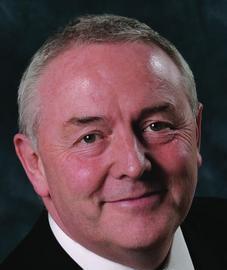Keith Marshall, chief executive, Summit Skills.
Profile in association with Ferroli
Keith Marshall has got his sights set firmly on the future. Not just three or four years from now but 10 years down the road. That, he says, is when the impact of Summit Skills – the sector skills council for the building services engineering industry – will be felt the most.
Having single handedly set up Summit Skills in March 2003, Marshall, now aided by his 23-strong team, has the unenviable task of identifying the skills and training requirements within the building services engineering sector for the years to come.
“We’re trying not to worry about today’s and tomorrow’s problems but leapfrog to what the problems are going to look like in 10 years time and start to do something about it now,” he says, though quickly stressing that they are not ignoring the short-term needs totally.
Part of this long-term plan involves linking up with the big building projects before they get under way. “The argument being that the earlier we can engage with these people then the more chance there is that we’ll have the skilled people in the right place at the right time. If you say it takes three to four years to train an electrician or plumber then we need to be doing the planning for that six years ahead so the infrastructure is in place and they have got the time to do their training.”
Summit Skills is targeting the Thames Gateway and London’s 2012 Olympic bid, as well as consulting government departments on their building plans. “Before there wasn’t an organisation like ours that was capable of doing something with this information,” explains Marshall. “But it is worth thinking that far ahead because you have now got someone who can do something about it.”
The remit for Summit Skills is a broad one: as well as 14-19-year-olds on vocational courses, it covers more than half a million employees, from plumbers and electricians to chartered engineers. As an employer-led organisation, its objectives include alleviating skills gaps, providing career progression and improving productivity in the building services sector.
At the heart of all the sector skills councils are the sector skills agreements. “The idea is that it is a deal between the government and the employers,” explains Marshall. “Basically the government is saying, if you get your act together and sort out exactly what your skill needs are over a period – say five to 10 years ahead – then we the government will line up the education and training system so that it delivers what you say you want.” In exchange the government expects employers to buy into the plan and help pay for it. “Now the sector skills council is in the middle, drawing all these people together, so the first thing you need to do is be clear about what the skill needs for the sector are; that’s the first stage of the agreement, the bit we’re working on at the moment.”
Four of the sector skills councils are about to about to launch such agreements. “We’re probably nine to 12 months behind them, and we are looking very closely at how they have got on,” says Marshall. “We’re working on the first stage, the labour market information project, and it’ll be the best part of 12 months before we get the whole agreement in place.”
The labour market information project is being carried out by BSRIA. “Once we get that information we know how many of what sort of person we need and when.” A draft of the report has just been produced. “There are no real surprises coming out of the LMI,” says Marshall. “It’s confirming the skills shortages that everybody knows about but perhaps defining it with a little more precision and certainly breaking it down on a regional basis.”
Unlike skills shortages, productivity is less easily measured. “Improving productivity just trips off the tongue so glibly. If you think of somebody assembling washing machines you can measure productivity easily but in this sector if you talk to half a dozen people about what productivity is you get half a dozen different answers and half a dozen different ways of improving it,” says Marshall. “To be perfectly honest we have not done anything structured or formal to take a very specific view on what productivity is because we would fall out with as many people as we’d agree with. However, we are carrying the argument that almost by definition if you improve skill levels you’re going to improve productivity and we’re concentrating on going at it from that direction.”
If 2004 is anything to go by, Marshall has got a busy year ahead of him. For one, he will be speaking about the workforce of the future at M&E The �ǿմ�ý Services Event in November (visit www.buildingservicesevent.com for more information). But it’s not just the future we should look to he says. “We should look at what we’ve achieved just as much as what’s ahead. It’s something I try to bring to the organisation, but it’s very easy to forget.”
Source
�ǿմ�ý Sustainable Design


















No comments yet